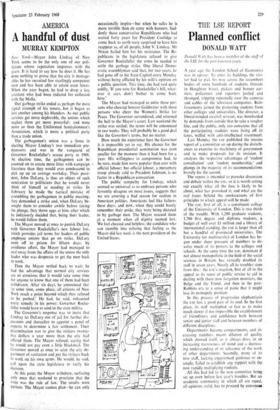Planned conflict
THE LSE REPORT DONALD WATT
Donald Watt has been a member of the staff of the LSE for the past fourteen years.
A year ago the London School of Economics was in uproar. To enter its buildings the visi- tor had to pick his way across the recumbent bodies of some hundreds of students. Outside in Houghton Street, pickets and banner car- riers, policemen and reporters jostled and thronged, tripping repeatedly over the cameras and cables of the television companies. Rein- forcements joined the protesting students from other colleges and universities. The director, a liberal-minded ex-civil servant, was bombarded by demands from outside that he take a tougher line, and the public, only too conscious that all the participating students were living off its taxes, welled with anti-intellectual resentment.
Last Monday the LSE published the interim report of a committee set up during the disturb- ances to examine its machinery of government and to make proposals, for its revision. It analyses the respective advantages of 'student consultation' and 'student membership,' and plumps in the majority of its recommendations bravely for the second.
The report is intended to provoke discussion and debate'within the LSE, so it is worth setting out exactly what all the fuss is likely to be .about, what has provoked it, and what are the real issues behind the smokescreens of first principles to which appeal will be made.
The LSE, first of all, is a constituent college of the University of London. This is two thirds of the trouble. With 1,200 graduate students, 1,700 first degree and diploma students, a budget of well over £1 million and a library a international standing, the 1...se is larger than all but a handful of provincial universities. The University (or multiversity) of London has be- gun under sheer pressure of numbers to de- volve much of its powers to the colleges and schools. At the same time the LSE, dominant if not almost monopolistic in the field of the social sciences in Britain, has virtually doubled its staff in seven years. Nearly all its troubles stem from this: the LSE's reaction, first of all to, the appeal to its sense of public service to aid in dealing with those now forgotten monsters, the Bulge and the Trend; and then in the post- Robbins era to a sense of panic that it might lose its monopoly position.
In this process of progressive elephantiasis the LSE lost a good part of its soul. In the first place, its staff multiplied so fast as to make much slower if not impossible the establishment of friendliness and confidence both between senior and junior staff and between members of different disciplines.
Departments became compartments, and in- creasing numbers meant dilution of quality which showed itself, as it always does, in an increasing narrowness of mind and a decreas- ing understanding of or tolerance of the work of other departments. Secondly, many of its new staff, lacking experienced guidance or ex- ample, failed to establish any rapport with the now rapidly multiplying students.
All this had led to the new committee being set up even before last year's troubles. But an academic community in which all are equal, all opinions valid, has to proceed by consensus
and conciliation not by coercion. The main ideas in this week's report were all under discus- sion two years ago. What is surprising is how far they go, more a tribute to the radical drive still to be found in the LSE than to the students' disturbances, which if anything slowed the pro- cess down. Controversy is bound to focus now on three issues: the role of non-academic governors on the Court and the Council; the role of the new organ, the Senate; and whether there should be more student members on more committees now that the radical students' de- mand for parity of numbers on all committees has been rejected.
The first issue is an important one. At present the Board of Governors, a largely honorific organ of seventy-eight members, meeting only twice a year, has only five academic members. The Standing Committee has three academics out of some dozen or so. The new Court will have sixty members, twelve academics and four to eight students. The new Council will have twenty-four members, fourteen of them aca- demics and three students. There is thus a con- siderable increase in academic control of these bodies even in formal terms. In practical terms the academics usually took the lead anyway. The radicals want to establish a kind of colle- giate isolationism; ostensibly for fear of control by the Establishment. The real criticism of the Governors in the past has been that they have not done enough for the Lse nor identified themselves loyally with it, when needed; and that too many have derived distinction from rather than lent distinction to the LSE by their association with it. But an academic community isolated from an outside world which it regards with hostility and suspicion is not quite what the LSE should wish to become.
The establishment of a fifty-strong senate composed of sixteen professorial heads of departments, eight other professors, fifteen non-professorial staff and five students together with six ex-officio members, is a recog- nition of necessity. A Board of 300 members meeting twice a term for three hours is not a competent body for all the problems of growth, policy and financial stringency that crowd in on the academic community today. In practice a highly oligarchic set of committees, the most important being the body of professors meet- ing under the guise of the Appointments Com- mittee, had come to dominate affairs. The Senate, properly constituted, will be a consider- able improvement on that.
The danger to all this lies in the excessive formalism which assumes conflict and wishes to provide for all possible situations in advance. Today's students, or rather the barrack room lawyers among them, are obsessed by formal- ism. Some of the radically-minded staff share their predilections. Between them, in an atmo- sphere where last year's passions and suspicions still run very deep, they could wreck things—as some more conservative-minded members of the staff believe they desire to. In the melee the real cost may well be the international reputa- tion of the LSE, where already some five pro- fessorial posts and a good many more at the lower levels have been vacant for a year or more for lack of really well-qualified scholars to fill them. The LSE, like Britain today, runs the danger of becoming a totally democratic, totally egalitarian slum.



































 Previous page
Previous page